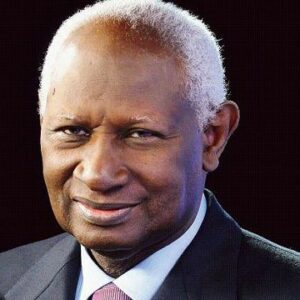Abdou Diouf served as the second President of Senegal from 1981 until 2000. He is regarded as a renowned African leader who has made remarkable contributions to the political and socioeconomic development of Africa. Born in Senegal, he attended St. Louis for his elementary and secondary school before moving to Paris to study law. Shortly after returning home, he joined the civil service and was promoted to a variety of positions, including assistant to the Secretary-General of the Government and Secretary-General of the Ministry of Defense. Soon after, he was appointed Director of President Leopold Senghor’s Cabinet and Secretary General of the Republic of Senegal’s Presidency. After a decade as Senegal’s prime minister, President Leopold subsequently nominated him as his successor. As President of Senegal, he represented his country internationally and emphasized cooperation with other African nations. As his predecessor had begun, he promoted political liberalization and held elections in 1983, 1988, and 1993, all of which he won. He has also participated in international organizations and advocated for greater African unity, including serving as the chairman of the Organization of African Unity. In 2000, following his defeat in the general elections, he resigned peacefully, bringing an end to the 40-year hegemony of the Socialist Party in Senegal.
Youth and Early Life
Abdou Diouf was born in Louga, Senegal, on September 7, 1935, to a devoutly Muslim father and a Hal ‘Pulaar’ mother. His father was a mail carrier and a member of the Serer ethnoreligious community.
He attended the Lycée Faidherbe in Saint-Louis for his primary and secondary schooling. After graduating from Dakar University in 1959, he studied law at the Sorbonne in Paris.
Abdou Diouf’s Career
In September 1960, following his graduation, Abdou Diouf returned to Senegal where he was named Director of International Technical Cooperation.
In December 1960, he was appointed assistant to the Secretary-General of the Government, and in June 1961, he was appointed secretary-general of the Ministry of Defense.
In 1961, he joined the Senegalese Progressive Union party, which was eventually reformed as the Senegalese Socialist Party. Subsequently, he was appointed governor of the Sine-Saloum region, a position he held until December 1962, after which he was appointed director of the Ministry of Foreign Affairs’ Cabinet.
Until December 1965, he held the office of Director of the Cabinet of President Léopold Senghor, which he assumed in May 1963.
In addition, he was appointed Secretary-General of the Presidency in January 1964, a position he held until March 1968. Until February 1970, he then served as Minister of Planning and Industry.
Abdou Diouf was appointed Prime Minister of Senegal on February 26, 1970, when President Senghor reestablished the position. He held his position till December 31, 1980.
Senghor resigned as the president in favor of Abdou Diouf on January 1, 1981, and Diouf became the next President of Senegal.
In 1983, he completed the political liberalization begun by his predecessor by conducting elections. He permitted fourteen opposition parties to compete in the elections, resulting in their fragmentation and won with 83.5% of the vote.
In 1985, the opposition parties failed in their attempt to create a coalition on the grounds that the constitution prohibited coalitions.
In February of 1988, he was re-elected with 72,3 percent of the vote. The election results were widely criticized, and opposing parties accused his administration of electoral fraud.
In February 1993, he was re-elected to a seven-year term with 58 percent of the vote. In the year 2000, he was defeated in the elections by Abdoulaye Wade and resigned without protest.
In October 2002, following his resignation as President of Senegal, he was overwhelmingly elected as the 2nd Secretary-General of “La Francophonie.”
He became Secretary-General in January 2003 and was re-elected for another four years at the organization’s September 2006 summit. He occupied this position till December 2014.
In addition to his political contributions, he served as president of the Organization for African Unity (OAU) from 1985 to 1986. In 1992, he was re-elected for another one-year term as president of the OAU.
He is a distinguished member of the “Sergio Vieira de Mello Foundation.” He is also a member of the honor committee of the Fondation Chirac and the International Advisory Board of the International Multilateral Partnership Against Cyber Threats (IMPACT).
Abdou’s Major Opera
Abdou Diouf launched an anti-AIDS initiative in Senegal in 1986, pushed safe-sex messages, and urged prostitutes to register. Additionally, he pushed civic organizations and religious leaders to raise awareness of the sickness. Consequently, despite the high prevalence of AIDS in most African nations, it stayed below 2% in Senegal.
Awards & Achievements
Abdou Diouf received the prestigious “King Faisal International Prize” for his contributions to Islam.
In acknowledgment of his exceptional service to Senegal and the Muslim world, he was also awarded eleven honorary doctorates and a number of important medals.
Personal History and Legacy
In 1963, Abdou Diouf wed Elisabeth Diouf.
Estimated Net Worth
Abdou Diouf has an estimated net worth of $3 million and earns a living mostly as a lawyer and politician. We lack sufficient evidence regarding Abdou Diouf’s cars and way of living.


